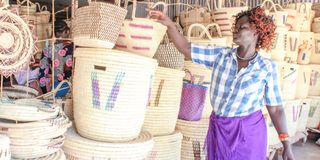Weaving their way out of poverty

Salome Ekuam, a member of Kerio Basket Makers Self-help Group, prepares baskets for sale.
What you need to know:
- A group of women in Turkana County are making eco-friendly shopping bags from palm tree leaves, thanks to a 2017 government ban on plastic carrier bags.
- Two years ago, the group of 20 pooled resources with each member contributing Sh1,000 to raise capital and kick-start the small-scale basket making business.
- The group recently received support from the Hunger Safety Net Program, which also encouraged them to make mats and brooms.
A group of women in Turkana County are basking in glory after investing in making eco-friendly shopping bags from palm tree leaves, thanks to a 2017 government ban on plastic carrier bags.
The women, who for years have depended on relief supplies for sustainability, can now afford a smile as they can generate money to buy food and make savings to educate their children and plan for their future.
Ms Mary Erakai from Kerio, Turkana Central and member of Kerio Basket Makers’ Self-help Group, is among beneficiaries of the scheme, which has transformed her socio-economic livelihood.
“We are receiving a lot of orders from cereal and fruit vendors who are switching from plastic to biodegradable bags,” says Ms Erakai a mother of six.
Small-scale basket
Two years ago, the group of 20 pooled resources with each member contributing Sh1,000 to raise capital and kick-start the small-scale basket making business.
“There is steady market for the decomposable bags in western Kenyan region with the carriers going between Sh300 and Sh1,500 depending on size, quality of material and face paint,” Ms Erakai explains.
The plastic bags are popular among vegetable and snack dealers, breeders of tree seedlings and packaging of small items but the materials have become a source of environmental pollution.
The National Environment Management Authority (Nema) and county governments have been empowered to enforce the ban, which was operationalised three years ago.
The Ministry of Environment introduced a fine of Sh50,000 for anyone found with plastic shopping bags while manufactures flouting the ban are fined between Sh2 to Sh4 million.

A member of Kerio Basket Makers’ Self-help Group sorting out their products.
“We have crack-down on individuals involved in illegal importation of the plastic bags and seal off areas where the products are sneaked into the country,” says John Chumo, secretary of the national environment complains committee.
He says the taskforce, which receives complaints on environmental pollution has received reports of illegal importation of the banned plastic bags through the Kenya-Uganda border.
The Kenya Forest Service (KFS) and Kenya Forestry Research Institute (Kefri) have developed alternative decomposable materials to the plastic bags.
“The demand for the eco-friendly bags has taken a new twist since the ban of plastic bags was introduced. We can now receive orders, which translates to profits enabling us to be self-reliant in terms of income generation to sustain our families,” says Salome Ekuam, a member.
According to her, the nascent business has created employment to five other women engaged in weaving.
Business outlets
Her effort has in recent months, transformed her from a housewife to an employer setting up business outlets in Lodwar, Kakuma and Lokichar towns.
She pays an average of Sh15,000 monthly to the five women she has employed to weave the products in the outlets.
“I generate an average of Sh20,000 monthly from the business, which has enabled me to take my children to school and afford a decent meal,” says Ms Erakai.
Two of her children are in secondary school, while the rest are in primary and she comfortably meets their needs, thanks for the basketry business.
The group recently received support from the Hunger Safety Net Program, which also encouraged them to make mats and brooms.
“The steady income from the basketry has empowered most of the members to diversify to cereal business and other micro-finance investments, which has transformed their lives for the better,” Ms Erakai says.
But there is no business without challenges.
Emerging entrepreneurs
“The poor state of roads linking Lodwar and Makutano in West Pokot and Kitale in Trans Nzoia remains our main shortcoming. We cannot expand our market,” Ms Erakai explains.
Lack of market information has exposed the emerging entrepreneurs to exploitation by cartels who offer low prices for the commodities and sell at exorbitant prices, earning abnormal profits.
“In most cases, we sell our products to middle-men who have market links in other parts of the country,” adds Ms Ekuam.
The government has, however, beefed security along the Lodwar- Makutano highway and repaired the road to boost trade in the three countries.
Turkana County Government is also supporting the women entrepreneurs by offering them loans and market information to enable them expand their businesses.




